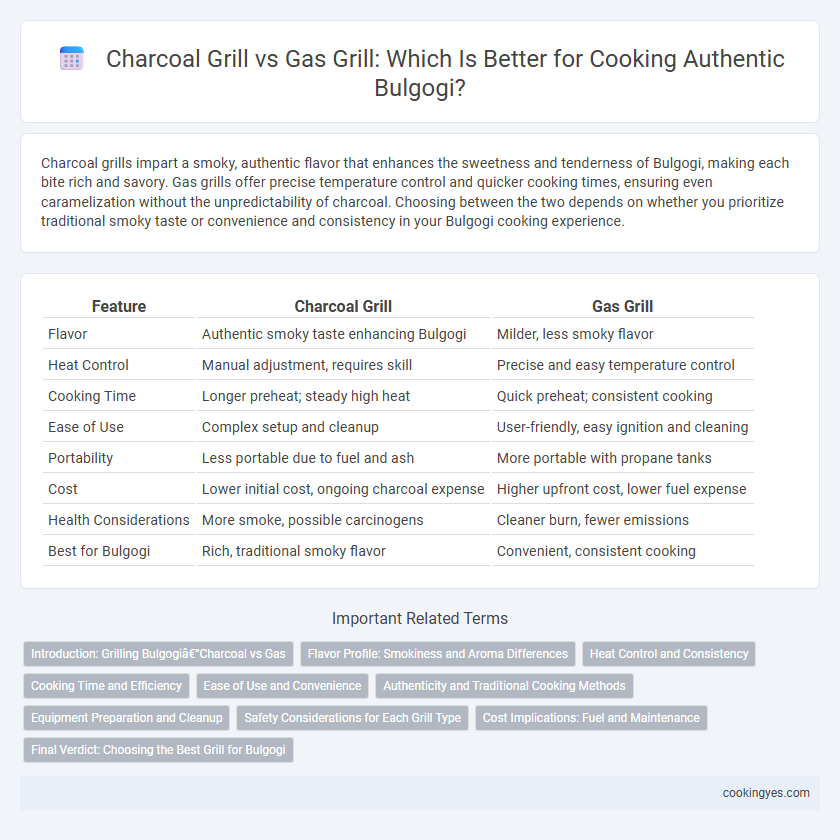Charcoal grills impart a smoky, authentic flavor that enhances the sweetness and tenderness of Bulgogi, making each bite rich and savory. Gas grills offer precise temperature control and quicker cooking times, ensuring even caramelization without the unpredictability of charcoal. Choosing between the two depends on whether you prioritize traditional smoky taste or convenience and consistency in your Bulgogi cooking experience.
Table of Comparison
| Feature | Charcoal Grill | Gas Grill |
|---|---|---|
| Flavor | Authentic smoky taste enhancing Bulgogi | Milder, less smoky flavor |
| Heat Control | Manual adjustment, requires skill | Precise and easy temperature control |
| Cooking Time | Longer preheat; steady high heat | Quick preheat; consistent cooking |
| Ease of Use | Complex setup and cleanup | User-friendly, easy ignition and cleaning |
| Portability | Less portable due to fuel and ash | More portable with propane tanks |
| Cost | Lower initial cost, ongoing charcoal expense | Higher upfront cost, lower fuel expense |
| Health Considerations | More smoke, possible carcinogens | Cleaner burn, fewer emissions |
| Best for Bulgogi | Rich, traditional smoky flavor | Convenient, consistent cooking |
Introduction: Grilling Bulgogi—Charcoal vs Gas
Grilling Bulgogi over a charcoal grill enhances its smoky aroma and imparts a traditional, rich flavor that closely resembles authentic Korean barbecue. Gas grills offer consistent heat control and convenience, making them ideal for evenly cooking marinated beef without the need for extensive preparation. Selecting between charcoal and gas grills depends on balancing the desire for deep, smoky taste with ease of use and temperature precision.
Flavor Profile: Smokiness and Aroma Differences
Charcoal grills infuse Bulgogi with a distinctive smoky aroma and deeper char flavor due to the natural combustion of wood or charcoal, enhancing the meat's caramelization and complexity. Gas grills provide more consistent heat control but lack the intense smokiness that elevates traditional Bulgogi dishes, resulting in a milder aroma and less pronounced flavor depth. The choice between charcoal and gas grilling significantly impacts the Bulgogi's smoky notes and overall sensory experience, with charcoal favored for authentic grilling aroma.
Heat Control and Consistency
Charcoal grills provide intense, smoky heat that enhances the authentic flavor of bulgogi but require careful monitoring to maintain consistent temperature. Gas grills offer precise heat control through adjustable burners, ensuring even cooking and reducing the risk of overcooking delicate marinated beef slices. For optimal bulgogi preparation, gas grills deliver reliable consistency, while charcoal grills impart traditional smoky nuances.
Cooking Time and Efficiency
Charcoal grills provide high, consistent heat that enhances the smoky flavor of Bulgogi while requiring longer preheating and cooking times compared to gas grills. Gas grills offer faster ignition and precise temperature control, reducing overall cooking time and improving efficiency without compromising the tender texture of the marinated beef. Optimal Bulgogi preparation benefits from charcoal's traditional smokiness, but gas grills ensure quicker turnaround for high-volume cooking needs.
Ease of Use and Convenience
Charcoal grills provide authentic smoky flavor ideal for Bulgogi but require more time for lighting and temperature control, which can be challenging for beginners. Gas grills offer ease of use with quick ignition and adjustable heat settings, making them more convenient for consistent cooking. Choosing between the two depends on balancing the desire for traditional flavor versus user-friendly operation.
Authenticity and Traditional Cooking Methods
Charcoal grills impart a smoky aroma and subtle char that enhances the authentic flavor of Bulgogi, closely aligning with traditional Korean barbecue methods. The high, direct heat from charcoal allows for caramelization of the marinade, creating the distinctive savory-sweet glaze characteristic of classic Bulgogi. Gas grills, while convenient and easier to control, often lack the intense smokiness and depth of flavor achieved through charcoal grilling, making them less ideal for achieving true authenticity in Bulgogi preparation.
Equipment Preparation and Cleanup
Charcoal grills enhance Bulgogi cooking by imparting a smoky flavor through evenly distributed heat, requiring preparation of charcoal briquettes and tools for managing ash. Gas grills offer precise temperature control with convenient ignition and faster cleanup, as they produce less residue and eliminate the need for ash disposal. Equipment cleanup for charcoal grills involves removing ashes and scrubbing grates, while gas grills typically need a simple brush down and occasional burner maintenance.
Safety Considerations for Each Grill Type
Charcoal grills, while providing an authentic smoky flavor essential for traditional Bulgogi, require careful handling due to open flames, hot coals, and potential carbon monoxide buildup, necessitating outdoor use and proper ventilation for safety. Gas grills offer more controlled heat and easier ignition, reducing flare-ups and minimizing fire hazards, but require regular checks for gas leaks and secure connections to prevent accidents. Both grill types demand vigilance, with charcoal emphasizing fire management and gas grills focusing on leak prevention for safe Bulgogi cooking.
Cost Implications: Fuel and Maintenance
Charcoal grills for bulgogi cooking typically incur higher ongoing fuel costs due to frequent purchases of charcoal briquettes, while gas grills use propane or natural gas, which tend to be more cost-effective and provide more consistent heat. Maintenance expenses for charcoal grills are generally higher because of ash disposal and grill cleaning after each use, whereas gas grills require periodic inspection and replacement of gas lines or burners, often resulting in lower long-term maintenance costs. Considering fuel efficiency and upkeep frequency, gas grills offer a more budget-friendly option for regular bulgogi preparation.
Final Verdict: Choosing the Best Grill for Bulgogi
Charcoal grills impart a smoky, authentic flavor to bulgogi that enhances its traditional taste profile, making them ideal for purists seeking rich, intense flavors. Gas grills offer precise temperature control and convenience, allowing for consistent cooking and ease of use, which benefits those prioritizing efficiency and simplicity. For the best bulgogi experience, charcoal grills are preferred for flavor depth, while gas grills suit those valuing control and practicality.
Charcoal Grill vs Gas Grill for Bulgogi Cooking Infographic

 cookingyes.com
cookingyes.com